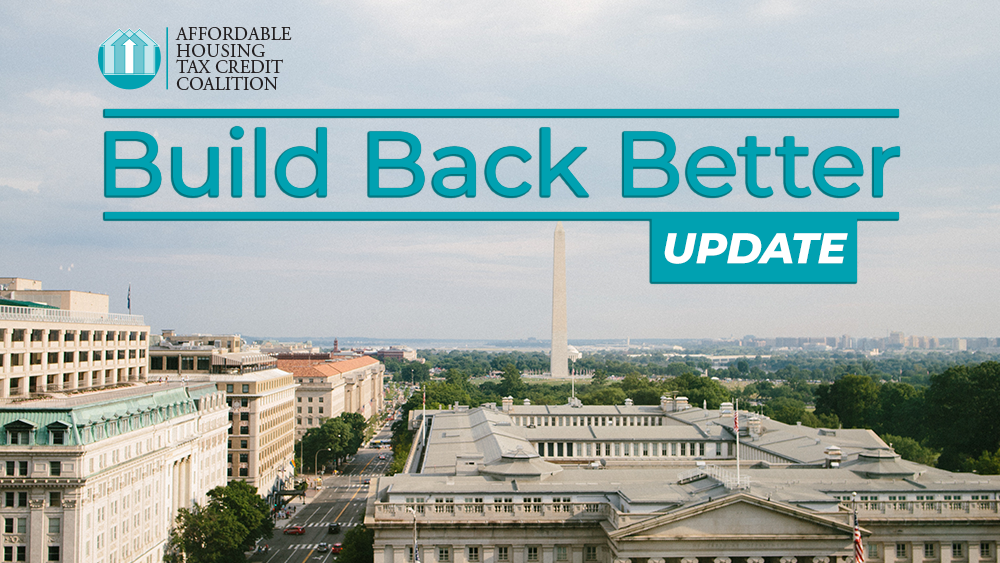Today the Biden Administration announced that the American Jobs Plan infrastructure proposal would provide $55 billion of additional investment for the Low-Income Housing Tax Credit (Housing Credit), allowing for the production or preservation of hundreds of thousands of additional affordable homes. More details about these and other tax components of the American Jobs Plan are expected to be released in the Treasury Department’s Green Book on Friday, along with additional details about the Biden Administration’s proposed budget.
Overall, the American Jobs Plan proposes $213 billion in direct funding and “more than $100 billion in new and expanded tax credits with bipartisan support to build and modernize housing across the country,” with the $55 billion proposed for the Housing Credit making up the largest investment in any single housing program. In total, the plan would produce or preserve more than two million affordable homes and create thousands of jobs.
“The American Jobs Plan would provide hundreds of thousands of affordable homes through an expansion of the Housing Credit – a bipartisan and proven solution to meet the vast need for affordable rental housing,” said AHTCC Executive Director Emily Cadik. “The Affordable Housing Tax Credit Coalition applauds the Biden Administration’s proposal to make this historic investment in the Housing Credit.”
“The affordable housing proposals released today would provide tremendous benefits, not just to residents, but to entire communities. Affordable housing brings jobs, economic vitality, and opportunity,” said AHTCC Board President Matt Josephs, Senior Vice President of the Local Initiatives Support Corporation.
Housing Credit Investment
The American Jobs Plan affordable housing fact sheet explains, “Financing the construction or rehabilitation of affordable rental housing for low-income households is challenging. The Low-Income Housing Tax Credit (LIHTC) reduces financing barriers by offering federal income tax credits to private investors in exchange for equity investments in affordable rental housing. As the federal government’s primary tool for financing affordable housing, LIHTC currently produces an estimated 100,000 units per year. President Biden’s plan will build on this success by proposing to invest an additional $55 billion in tax credits, enabling the creation of tens of thousands more units each year, including more units in high opportunity neighborhoods.”
The previously released American Jobs Plan outline and Made in America Tax Plan had called for “a marked increase in the resources available through the Low-Income Housing Tax Credit and other housing incentives,” but did not provide further details.
Additional Funding for Other Affordable Housing Programs
The proposal also calls for significant investments in “successful housing subsidy programs that pair with LIHTC to produce and preserve housing that is affordable for very- and extremely-low income renters,” and other affordable housing programs. The plan would provide:
- $45 billion for the National Housing Trust Fund,
- $40 billion for the Public Housing Capital Fund,
- $35 billion for the HOME Investment Partnership Program,
- $20 billion for the Neighborhood Homes Investment tax credit to revitalize single-family homes in distressed communities,
- $12 billion for the Capital Magnet Fund,
- $2 billion for new Project-Based Rental Assistance agreements, the first new funding in more than 20 years,
- $2 billion to build and rehabilitate housing across rural America,
- $2 billion to address housing, infrastructure, and community development needs in Indian Country, and
- $2 billion for senior housing through Section 202.
The plan would also provide:
- $10 billion for a new Community Revitalization Fund for investments in community spaces,
- $5 billion to incentivize local zoning reforms,
- $3 billion to fund the inspection and removal of lead-based paint from 175,000 housing units,
- $2 billion for a new Community Development Block Grant Program for resilience activities in communities vulnerable to climate change,
- $250 million for Main Street grants to revitalize small downtowns, and
- Additional funding to make housing more energy efficient and resilient.
The Path Forward for Infrastructure Legislation
The new details on the American Jobs Plan provide additional information about the Biden Administration’s priorities as bipartisan congressional negotiations over infrastructure legislation continue. With Republicans seeking a package that is smaller in scope, the parties are still far apart and negotiations may stretch into the summer. However, if bipartisan negotiations stall, Democrats may still pursue a Democratic-only infrastructure and economic recovery bill that could pass through the budget reconciliation process. In the coming weeks, building co-sponsorship of the Affordable Housing Credit Improvement Act (AHCIA) will continue to be important to lay the groundwork for the inclusion of Housing Credit priorities in infrastructure or other tax-related legislation that may advance through Congress.
Learn more about the role of affordable housing as infrastructure in our fact sheet.
Register for the 2021 Virtual Convening to Learn More
Wednesday, June 9, 2:00 – 5:00 pm ET
The 2021 Virtual Convening, co-hosted by the Affordable Housing Tax Credit Coalition (AHTCC) and Housing Advisory Group (HAG), will feature remarks from Senate Finance Committee Chairman Ron Wyden (D-OR), Senator Todd Young (R-IN), House Ways and Means Committee Chairman Richard Neal (D-MA), Rep. Jackie Walorski (R-IN), and Special Assistant to the President for Housing and Urban Policy Erika Poethig. We’ll also further discuss the status of infrastructure legislation and what it may mean for the Housing Credit.
Register here. Registration is free for members of the AHTCC and HAG. For non-members, the registration fee is $100. Once your membership is verified or payment is approved, you will receive your login information. Contact Erin O’Connor with registration questions. The deadline to register is Monday, June 7.



Comments are closed.